
Alcazar is a Swedish nu-disco group. Alcazar is one of Sweden's most successful music groups both nationally and internationally with a string of hits since their debut single in 1999. Worldwide, Alcazar sold over 12 million records between 2001 and 2004. Alcazar also had success globally in 2000 with their song "Crying at the Discoteque", having charted in USA, Brazil, Australia, Japan and most countries in Europe.

"Someday We'll Be Together" is a song written by Johnny Bristol, Jackey Beavers, and Harvey Fuqua. It was the last of twelve American number-one pop singles for Diana Ross & the Supremes on the Motown label. Although it was released as the final Supremes song featuring Diana Ross, who left the group for a solo career in January 1970, it was recorded as Ross' first solo single and Supremes members Mary Wilson and Cindy Birdsong do not sing on the recording. Both appear on the B-side, "He's My Sunny Boy".
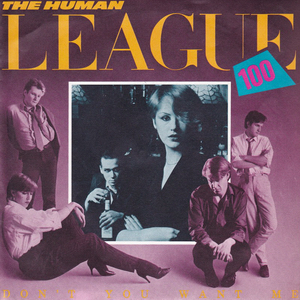
"Don't You Want Me" is a song by British synth-pop group the Human League. It was released on 27 November 1981 as the fourth single from their third studio album, Dare (1981). The band's best known and most commercially successful song, it was the best selling UK single of 1981, that year's Christmas number one, and has since sold over 1,560,000 copies in the UK, making it the 23rd-most successful single in UK Singles Chart history. It topped the Billboard Hot 100 in the US on 3 July 1982, where it stayed for three weeks.

Someday My Prince Will Come is the seventh studio album by Miles Davis for Columbia Records, catalogue CL 1656 and CS 8456 in stereo, released in 1961. Recorded at Columbia's 30th Street Studio in Manhattan, New York City, it marked the only Miles Davis Quintet studio recording session to feature saxophonist Hank Mobley.

"Someday" is a song by American singer and songwriter Mariah Carey from her self-titled debut studio album (1990). It is a dance-pop, new jack swing and R&B song. Prior to Carey signing a record contract, she and producer Ben Margulies had written and produced a four-track demo which included "Someday". After signing a contract with Columbia Records, Carey began work on her debut album and she reached out to Ric Wake to ask if he would produce the song, to which he agreed. The composition of the demo recording was changed during the recording process, most notably replacing the horns with a guitar, which Carey disapproved of.

"Someday" is a song by Canadian rock band Nickelback. It was released on 28 July 2003 as the lead single from their fourth studio album, The Long Road (2003). It reached number one in Canada for three weeks and number seven in the United States. In the latter country, it charted for 50 weeks, thus becoming Nickelback's longest-charting single. It also charted within the top 10 of the UK Singles Chart, where it peaked at number six.
Someday or Some Day may refer to:
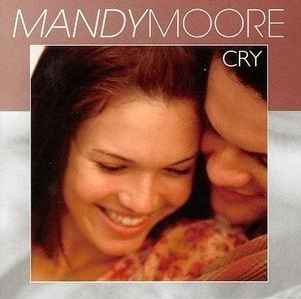
"Cry" is a song by American recording artist Mandy Moore, released on November 4, 2001, by Epic Records. It was written by James Renald, and co-produced by Renald and Peter Mokran. The song was released as a single from the soundtrack A Walk to Remember: Music From the Motion Picture and was also the third and final single from her self-titled second studio album.
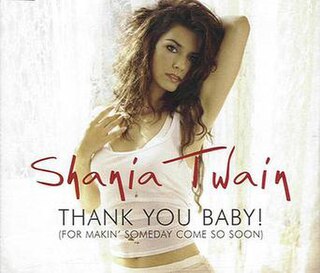
"Thank You Baby! " is a song by Canadian singer Shania Twain. It was released as the fifth single from her fourth studio album Up! on August 11, 2003. It was one of two singles, along with "Ka-Ching!", to be exclusively released to Europe. The song was written by Twain and her then-husband Mutt Lange. It was announced onstage by Twain that "Thank You Baby!" would be the next single from Up! at her Kilkenny concert, her first concert since the Come On Over Tour ended in December 1999.

"No Regret" is an R&B song by singer-songwriter Koda Kumi. The song debuted on the Oricon charts at No. 4, remaining on the charts for twelve weeks. The single made it the eighth release for her 12 Singles Collection, and, unlike the majority of the singles, was not limited to 50,000 copies. This was one of three that were not limited, the other being the first single in the collection, you, and the final single, Someday/Boys♥Girls.

Cream of the Crop is the eighteenth studio album released by Diana Ross & the Supremes for the Motown label. It was the final regular Supremes studio album to feature lead singer Diana Ross. The album was released in November 1969, after the release and rising success of the hit single "Someday We'll Be Together."

"Someday I'll Be Saturday Night" is a song by American rock band Bon Jovi from their 1994 greatest hits album, Cross Road. Released as a single on February 5, 1995, the song reached number seven on the UK Singles Chart and became a top-10 hit in Australia, Finland, Iceland, and Ireland.

"Someday Soon" is a song recorded by Australian singer and actress Natalie Bassingthwaighte. It was written by Bassingthwaighte, Alex Smith and Paul Barry, and produced by Smith and Brian Rawling. The song was released on 8 December 2008 as the second single from Bassingthwaighte's debut solo album 1000 Stars. Lyrically, "Someday Soon" is "an inspirational anthem about believing that anything is possible". Upon its release, the song peaked at number seven on the ARIA Singles Chart and was certified platinum by the Australian Recording Industry Association for sales exceeding 70,000 copies.

"Crying at the Discoteque" is a song by Swedish band Alcazar from their debut studio album, Casino (2000). The track samples Sheila and B. Devotion's 1979 hit "Spacer". Alexander Bard produced the song and can be heard in the middle of this song. Released in April 2000, "Crying at the Discoteque" became Alcazar's first international hit single the following year, reaching number one in Hungary and the top 10 in Flanders, Germany, Ireland, Italy, and Switzerland.
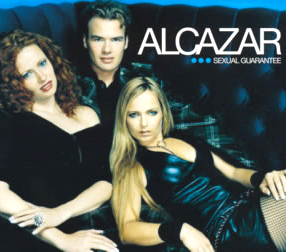
"Sexual Guarantee" is a song by Swedish band Alcazar. It was released as the fourth single from their debut studio album, Casino (2000), and samples Chic's 1979 hit "My Forbidden Lover". The song charted across Europe, reaching the top 20 in Belgium, Italy and the Netherlands.

Annika Eva Ingegerd Kjærgaard(originally Johansson) is a Swedish singer and former member of the Swedish pop group, Alcazar.
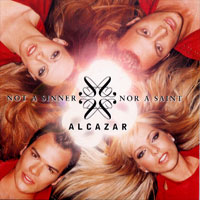
"Not a Sinner nor a Saint" is a Eurodance song performed by Swedish band Alcazar. This was the first single to give a preview of the then-forthcoming album Alcazarized, but was only released in Sweden. Nevertheless, the song was added at radio stations around Europe.

This is the discography of Swedish dance/pop group Alcazar, who have released three studio albums on Sony BMG, one compilation and one EP album
"Someday" is a song from Disney's 1996 animated feature film, The Hunchback of Notre Dame. It was written by composer Alan Menken and lyricist Stephen Schwartz and originally recorded by American singer and actress Heidi Mollenhauer in her film role as the singing voice of Esmeralda. It was one of three recordings, along with "In a Place of Miracles" and "As Long as There's a Moon", that were discarded during the storyboarding process to be replaced by "God Help the Outcasts." The codirectors Gary Trousdale and Kirk Wise both desired a quieter song for Esmeralda's scene inside the Notre Dame cathedral.

"Someday at Christmas" is a song by American singer Stevie Wonder, from his first Christmas album and same-titled eighth studio album (1967). Written by Ron Miller and Bryan Wells, it was produced by Henry R. Crosby. Initially released as a standalone single in 1966, it led to the recording of its parent album which was issued a year later. Described retrospectively as "a modern holiday classic", "Someday at Christmas" gained greater popularity with the version released by the Jackson 5 in 1970 on the Jackson 5 Christmas Album, with younger brother Michael Jackson singing lead with "youthful exuberance", according to Ebony magazine.


















